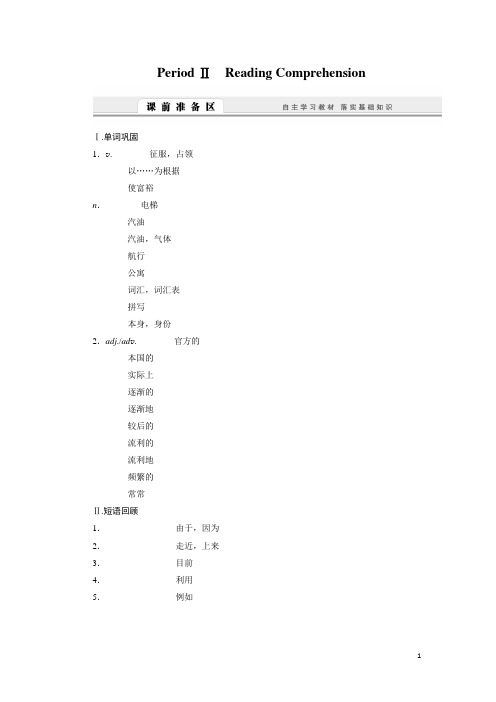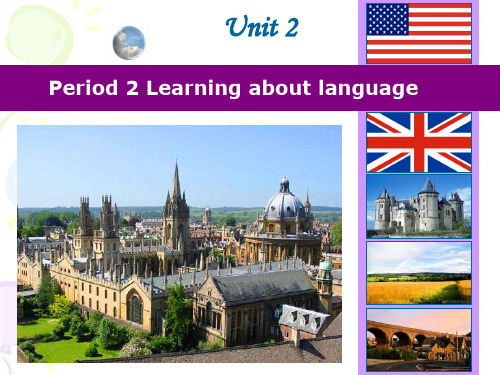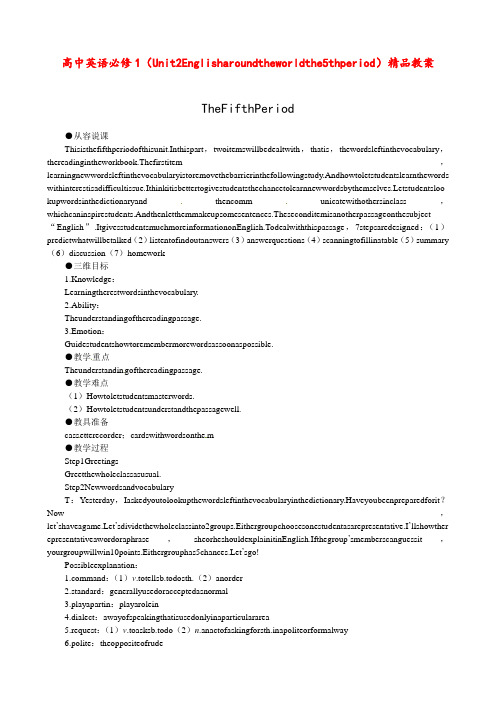Unit 2 English around the world Period 5 Listening 教学设计-公开课-优质课(人教必修1精品)
UNIT 2 English around the world fast reading

Do execise1 on P10 Do Reading Task on P2 Issue 3
Homework
1.翻译课文1--3段,写在作业本上。 2. 背诵5个句子。 3. 把知ilms are not worth seeing, the one you told me to see yesterday, ______. A. like B. such as C. besides D. for example 7. A series of problems faced by the public has ______ in the national conference. A. written down B. come up C. added up D. gone through 8. ______ what her mother said to her, she can now face all her difficulties bravely. A. Because of B. As C. For D. According to 9. Two singers will hold a concert in Beijing this month: one is Cai Yilin, and ______ is Zhou Jielun. A. one B. another C. the latter D. the other 10. The general ______ his soldiers to move on and said that they must win the battle. A. pushed B. advised C. commanded D. requested
UNIT 2 English around the world
高一英语人教版必修一导学案Unit 2 English around the world Period Ⅱ Reading Comprehension含答案

Period ⅡReading ComprehensionⅠ.单词巩固1.v. ________征服,占领________以……为根据________使富裕n.________电梯________汽油________汽油,气体________航行________公寓________词汇,词汇表________拼写________本身,身份2.adj./ad v. ________官方的________本国的________实际上________逐渐的________逐渐地________较后的________流利的________流利地________频繁的________常常Ⅱ.短语回顾1.________________由于,因为2.________________走近,上来3.________________目前4.________________利用5.________________例如Ⅰ.阅读课文,判断正误1.Nearly all of the English-speaking people lived in England at the end of 16th century.()2.In the 17th century,people in many other countries began to speak English as their first,second or a foreign language.()3.Native English speakers usually don’t speak the same kind of English,but they can sometimes understand each other.()4.English spoken in England between about AD 540 and 1150 was different from the English spoken today.()5.At first English was based more on German while the English spoken today is based on Danish and French.()6.The English language wasn’t settled until the 19th century.()7.Noah Webster wrote a dictionary,giving a separate identity to American English spelling.()8.Today English is widely spoken in the world except in South Africa.()Ⅱ.阅读课文,给每段选择正确大意1.Paragraph 1 ()A.Why has English changed over time?2.Paragraph 2 () B.Native English speakers can understand each other even if they don’t speak the same kind of English.3.Paragraph 3 () C.English is now spoken as a foreign or second language in South Asia.4.Paragraph 4 () D.Finally by the 19th century the language was settled.5.Paragraph 5 () E.Many people all over the world speak English.Ⅲ.阅读课文,完成下列表格1.Where did most of the English speakers live at the end of the 16th century?A.America. B.England.C.South Asia. D.South Africa.2.When did English begin to be spoken in many other countries?A.In the 17th century.B.At the end of the 16th century.C.Between about AD 450 and 1150.D.In the 19th century.3.According to the text,which of the following statements is TRUE?A.Languages always stay the same.B.Languages change only after wars.C.Languages no longer change.D.Languages change when cultures change.4.From Paragraph 3,we can learn that from AD 450 to 1150,English sounded more like ______.A.German B.Chinese C.French D.Russian5.Why does India have a very large number of fluent English speakers?A.Because Indians like learning English very much.B.Because India has the largest number of English learners.C.Because Britain ruled India from 1765 to 1947.D.Because India has a close relationship with Britain.Ⅴ.SummaryAs you know,English has changed over time.Why?1.________ all languages change and develop when cultures meet and 2.________ with each other.At first,English was 3.________ more on German than the English we speak 4.____________.Then 5.________ new settlers came and enriched the English language and especially its 6.________.So by the 1600’s Shakespeare was able to 7.____________ a wider vocabulary than ever before.In 1620 some British settlers moved to ter in the 18th century some British people were taken to Australia too.English began to be spoken in both countries.Finally by the 19th century the language was settled.At that time two big changes in English 8.________ happened:first Samuel Johnson wrote his dictionary and later Noah Webster wrote The American Dictionary of the English Language.The 9.________ gave a separate 10.________ to American English spelling.Period ⅡReading Comprehension 课前准备区Ⅰ.1.conquer;base;enrich;elevator;petrol;gas;voyage;apartment;vocabulary;spelling;identity2.official;native;actually;gradual;gradually;latter;fluent;fluently;frequent;frequently Ⅱ.1.because of e up 3.at present4.make use of 5.such as课堂活动区Ⅰ.1.T 2.F 3.F 4.F 5.F 6.T7.T8.FⅡ.1.E 2.B 3.A 4.D 5.CⅢ.1.German 2.ruled 3.less 4.enriched 5.1600’s6.made use ernment10.19th11.dictionary 12.foreignⅣ.1.B 2.A 3.D 4.A 5.CⅤ.1.Actually municate3.based 4.at present 5.gradually6.vocabulary7.make use tter10.identity。
-高一英语:-Unit2《English-around-the-world》Period4-市公开课

recognize vt. recognize that. . . recognize. . . as. . . recognize sb. to be
辨认出来; 认可; 公认 认可/意识到…… 把……认作…… 认可某人是……
6. So she asks directions and then tells her friends. (P15) 于是她问路,然后告诉她旳朋友们。
①On seeing her, the policeman recognized her as a pickpocket. (英译汉) 警察一见到她就认出她是个小偷。
②—Oh, it’s you! I___you.
—I’ve just had my hair cut, and I’ve wearing new glasses.
③It was___weather that everyone wanted to go outing. A. so fine B. such fine C. so a fine D. such a fine 【解析】选B。考察“such + adj. +不可数名词+that. . . ”构 造。句意:天气如此好以至于大家都想去郊游。
直接;挺直; 直旳;笔直旳 正直旳;坦率旳 坦诚布公地谈谈 开门见山地说 立即
昨天你们学校英语俱乐部就“Why should we learn English? ”这一话题进行了一场剧烈旳讨论,成果如下表。 请根据表格里旳内容写一篇海报。
注意:1. 词数100左右。 2. 根据内容可合适增添细节。
__________________________ __________________________ __________________________ __________________________
必修一unit_2_English_around_the_world_重点单词、短语和句型

Mr.Smith has a good command of spoken English.
史密斯先生对英语口语掌握得很好。
归纳总结 command v. & n.命令;指挥;掌握;博得 ___________________ 。
(1)at one's command 听某人支配
under one’s command 由……指挥
Similar National Flags
The United Kingdom of Great Britain and Northern Ireland
The Commonwealth of Australia
New Zealand
4.recognize
recognize Although many Americans move a lot,they still_______ and understand each other’s dialects.
under the command of sb. 在……指挥之下
have (a) command of 掌握;精通(尤指语言) take command of 控制 (be) in command of 掌握,控制 (2)command sb.to do sth. 命令某人做某事 command that...(should) do... 命令……
观察思考
Line up these men and see if the witness can recognize
the criminal. 让这些人站成一排,看看证人能否从中把罪犯认出来。 I recognized him though we were apart for years. 尽管我们分开多年了,我还是认出了他。
Unit2 English around the world Period 4 阅读与写作

Unit2 English around the worldPeriod 4 阅读与写作班级:__________ 组别:____________ 组名:___________ 姓名:___________【learning aims】1. To improve the students’ ability of reading.2. To improve the students’ ability of grasping the language points.3. Learn to make a poster【Important points】Words and phrases: believe it or not、play a part in、There is no such … as... 【Difficult points】Learn to make a poster.【Reference books】《学习高手》、课本.【Learning procedures】Step1 Read the text on Page13.1. 1. Read the passage and match topic sentences with each paragraph.(B级)①Prara1 A.. Geography plays a part in making dialects .②Prara2 B. There is no such thing as standard English③Prara3 C. American English has many dialects whose wordsand expressions are different from standard English2. Do many people believe the English spoken on TV and the radio is standardEnglish? Why? (C级)__________________________________________________________________________________________________________________________________________________________________________________________________________________________________________3.Why does American English have so many dialects?(D级)______________________________________________________________________Step2 .Read the text aloud and pay attention to your pronunciation and intonation .Step3 . Language points1.【课文原句】______________________________________________________(A级)【译文】信不信由你,(世界上)不存在诸如标准英语之类的语言。
Unit 2 English around the worldPeriod 1 文本研读课

Unit 2 English around the worldPeriod 1 文本研读课【学习目标】1)To improve the ability of reading.2) To learn something about the development of English.学习重难点: To analyze the whole passage and understand the passage better.【学习过程】Step I Try to remember the new words as quickly as possible. (记住单词是基础!)1. Read and recite new words and phrases from subway to request three times.2. 根据所给单词的首字母及中文释义,写出各单词的完整形式.(方法导引:先默写,然后核对答案,错误之处用红笔标出,写出正确答案并再加以巩固.)1)s________________ <美>(地铁) 2)o_________________ (官方的,正式的)3)v_________________ (航海,航行) 4)c __________________ (征服,占领)5)n _________________ (本国的;本国人) 6)a __________________ <美>(公寓住宅)7) b_________________ (以…为根据) 8)e __________________ (使富裕,充实,改善)9)v _________________ (词汇,词汇量) 10)s _________________ (拼写,拼写法)11)c ________________ (命令,指令) 12)r __________________ (请求,要求)3.学习下列单词,把单词和相应的英语解释连线.熟读并能会写.1) petrol A. who or what somebody or something is2) voyage B. a word for gas in British English3) gradually C. not sudden4) frequently D. in fact5) identity E. the second of two things or people already mentioned6) the latter F. often7) actually G. long trip by sea or in space8) fluent H. able to speak or write a language wellStep II warming up1. 学习下列单词,注意它们的不同.British English American English公寓住宅flat apartment地铁underground subway电梯elevator lift汽油petrol gas秋天autumn fall橡皮擦eraser rubber洗手间washroom toiletStep III Pre-reading1. In China, is English used as an official language, or do we learn it as a foreign language?____________________________________________________________________________ 2. List the countries that use English as an official language?_______________________________________________________________________________ 3. Which country do you think has the most English learners?_______________________________________________________________________________ Step IV Fast reading1. What’s the main idea of the passage?__________________________________________________________________________2. Read the passage, and then choose the best answer to each of the following questions.1) English has/had the most speakers ___________.A. nowadaysB. when the British ruled many parts of the worldC. in the time of ShakespeareD. in the 12th century2) From AD450 to 1150, English sounded more like _____________.A. FrenchB. ChineseC. GermanD. Russian3) Shakespeare’s English was spoken around __________.A. 1400’sB. 1150’sC. 450’sD. 1600’s4) Which country has the fastest growing number of English speakers in the world?A. AustraliaB. ChinaC. IndiaD. Britain我真棒!呃,还要努力!Step V Careful reading1. 阅读The Road to Modern English, 然后完成下列表格.2. Decide whether the statements are true or false.( ) 1) English is the most widely used language in the world today.( ) 2) English developed when new settlers and rulers came to Britain.( ) 3) Languages don’t change when cultures change.( ) 4) The language of the government is always the language of the country. ( ) 5) English is one of the official languages used in India.( ) 6) This reading passage describes the development of the English language.Step VI 疑难句解析.尝试分析下列句子,译成汉语并背诵.1. Native English speakers can understand each other even if then don’t speak the same kind of English.译文:__________________________________________________________________________句中even if 意为________,引导___________从句.用法与__________相同.2. Then gradually between about AD800 and 1150, English became less like German because those who ruled England spoke first Danish and later French.译文:________________________________________________________________________此句中because 引导__________从句.在这个从句中还有一个定语从句,是_____________________,其先行词是__________,是_________(词性).【学习反思】。
高中英语 必修1 (Unit2 English around the world the 5th period) 精品教案

高中英语必修1(Unit2Englisharoundtheworldthe5thperiod)精品教案TheFifthPeriod●从容说课Thisisthefifthperiodofthisunit.Inthispart,twoitemswillbedealtwith,thatis,thewordsleftinthevocabulary,thereadingintheworkbook.Thefirstitem,learningnewwordsleftinthevocabularyistoremovethebarrierinthefollowingstudy.Andhowtoletstudentslearnthewords withinterestisadifficultissue.Ithinkitisbettertogivestudentsthechancetolearnnewwordsbythemselves.Letstudentsloo kupwordsinthedictionaryand thencomm unicatewithothersinclass,whichcaninspirestudents.Andthenletthemmakeupsomesentences.Theseconditemisanotherpassageonthesubject “English”.ItgivesstudentsmuchmoreinformationonEnglish.Todealwiththispassage,7stepsaredesigned:(1)predictwhatwillbetalked(2)listentofindoutanswers(3)answerquestions(4)scanningtofillinatable(5)summary (6)discussion(7)homework●三维目标1.Knowledge:Learningtherestwordsinthevocabulary.2.Ability:Theunderstandingofthereadingpassage.3.Emotion:Guidestudentshowtoremembermorewordsassoonaspossible.●教学重点Theunderstandin gofthereadingpassage.●教学难点(1)Howtoletstudentsmasterwords.(2)Howtoletstudentsunderstandthepassagewell.●教具准备cassetterecorder;cardswithwordsonthe m●教学过程Step1GreetingsGreetthewholeclassasusual.Step2NewwordsandvocabularyT:Yesterday,Iaskedyoutolookupthewordsleftinthevocabularyinthedictionary.Haveyoubeenpreparedforit?Now,let’shaveagame.Let’sdividethewholeclassinto2groups.Eithergroupchoosesonestudentasarepresentative.I’llshowther epresentativeawordoraphrase,sheorheshouldexplainitinEnglish.Ifthegroup’smemberscanguessit,yourgroupwillwin10points.Eithergrouphas5chances.Let’sgo!Possibleexplanation:mand:(1)v.totellsb.todosth.(2)anorder2.standard:generallyusedoracceptedasnormal3.playapartin:playarolein4.dialect:awayofspeakingthatisusedonlyinaparticulararea5.request:(1)v.toasksb.todo(2)n.anactofaskingforsth.inapoliteorformalway6.polite:theoppositeofrude7.retell:totellastoryagainorinadifferentform8.accent:awayofsayingwordsthatshowswhatcountry,esfrom9.recognize:toknowwhothepersonis10.eastern:inorfromtheeast ofacountryorplaceT:Welldone!Nowlet’sdealwiththesomeofthewordsandphrasesindeal.mandv.命令,指挥commandsb.todo;commandsth.;博得,应得commandthat-clausee.g.Hecommandedhismantoretreat.ThetroopswerecommandedbyGerneralHaig.Thekingcommandedthatshe(should)beexecuted.(建议,命令,要求一类词后从句中用虚拟语气,此类动词有suggest,advise,order,request,require,command,demand...)Hecommanded thebuilding(should)betorndown.n.命令[C];指挥,控制[U]e.g.Areyourefusingtoobeymycommands?Youmustobeyhiscommandthatthebuilding(should)betorndown.Takecommandof;beincommand;underone’scommand;underthecommandofsb.e.g.Shetookcommandofthisclassaftertheformermanagerleft.Shefeltincommandofherlife.ThebattleshipisunderthecommandofCaptainBlake.2.requestv.requeststh.(fromsb.);requestsb.todo;requestthat-clausee.g.Youcanrequestafreecopyoftheleaflet(宣传单).Youarerequestednottosmokeintherestaurant.Sherequestedthatnoone(should)betoldofherdecision untilthenextmeeting.n.request(forsth.);request(that)e.g.Requestsforvisaswillbedealtwithwithin48hours.Herrequestthatmoresweetsbeservedwasrefused.3.recognize辨认出;意识到;承认recognizesb./sth.(by/fromsth.)通过……认出……;recognizesth.(assth.);把……认作是……recognizethat意识到;承认e.g.Irecognizedthehousefromyourdescription.Drugswerenotrecognizedasaproblemthen.Nobodyrecognizedhowurgentthesituationwas.Werecognizedthatthetaskwasnoteasy.4.standardn.规格,标准[C&U]raise/improve/lowerstandard提高/降低标准set(sb.)astandard给某人定一个标准e.g.Hesethimselfsuchahighstandardthatheoftendisappointshimself.ofhigh/lowstandard具高/低标准的standards行为标准,道德标准amanofhighstandards一个道德高尚的人Step3ReadingT:WehavelearntEnglishformanyyears.Theninyouropinion,whatisaveryimportanthelptoyourEnglishstudy?S:teachers,books,tapes...T:Anythingelse?IsthereanythingthatyoucanturntoforhelpwhenyouareconfusedwhilelearningEnglish?S:Ithinkadictionaryisagreathelp.T:Yeah.Whenwemeetacrossnewwordsweoftenlookthemupinadictionary.Whatisthemostwidely-useddictionaryinChin ese?S:XinhuaDictionary.T:ThenwhichonedoyouthinkisusedwidelyinEnglish?S:I’msorryIhavenoidea.T:It’s LongmanDictionary andthe OxfordEnglishDictionary.Today,we’llreadapassageonthe OxfordEnglishDictionary.Nowaccordingtothetitle,whatdoyouthinkwillbementionedinthepassage?S:Ithinkthewriter,thetimewhenwasitwritten,whyitwaswritten,howitwaswritten,thefeatureofthedictionarywillbementioned.T:Now,let’slistentoittoseewhetheryouranswerisrigh t.(afterlistening)T:Doyouthinkthatyouranswerisright?S:Ithinkthatitdoesn’tmentionthefeatureofthedictionary.T:Yes.Nowlet’sreaditaloudtoanswerthesequestionsthen.①Whywasitwritten?②Whendiditstarttobewritten?③Whoisthewriter?④Howitwaswritten?S:①Toencourageeverybodytospellthesame.②Theideawasraisedin1857.And22yearsl ater,itbegantobewritten.③Threemenworkedtogetheronthedictionary:SamuelJohnson,NoahWebster,andJamesMurray.④Ittookthethreemennearlyalloftheirlivestotrytocollectwords.T:Goodjob!Thenwhofirstbegantoworkonthedictionary?S:Murray.T:Yes.Nowlet’sreadthelastparagraph.AndthenfinishthetableaboutnotesonJamesMurray’slifewithyourpartners.(checktogether)Step4Consolidation/discussionT:Afterreadingit,canyousaysomethingaboutMurray?Let’sdoachainreaction.EachstudentjustsaysonesentenceaboutMurray.T:Doyouthinkitworthsothesepeople’sspendingsomuchtimeon?Why?Nowdiscusswithyourpartnerandlistsomereasons.(discussforabout3minutes)Now,it’sshowtime.S:Wethinkthatitworththeirjob.Iftherewerenodictionaries,peoplewouldhavenoruletoguidethemwhileusingthelanguage,whichwillleadtoamessinEnglishbecausedifferentpeople wouldusedifferentlawstouseit.Thentherewillbemoredifficul tyinunderstandingoneanother.Withthedictionary,peoplehaveasetruletojudgewhethertheirwayofusingthelanguageisright.Step5SummaryandhomeworkToday,wehavelearnedthewordsleftinthevocabularyandwe’vegotsomeinformationonthelargeEnglishdictionary.Afterclass,pleasereadthewordsagainandagaintorecitethemandtrytousethemtomakeupsentences.●板书设计Unit2EnglisharoundtheworldTheFifthPeriodWordsmand2.request3.recognize4.standardUnderstandingofthepassageGuessingQuestions●活动与探究ThisresearchistodoresearchontheconceptoftheOxfordDictionaryandsomeotherkindsofdictionaryinEnglishspok encountries.SostudentsshouldworkingroupstostudytheitemsoftheOxfordDictionaryandfindoutthenamesofothertypenames Themostpopularone ThereasonAbout theOxfordEnglishDictionaryThe OxfordEnglishDictionary istheacceptedauthorityontheevolutionoftheEnglishlanguageoverthelastmillenniu m.Itisanunsurpassedguidetothemeaning,history,andpronunciationofoverhalfamillionwords,bothpresentandpast.Ittracestheusageofwordsthrough2.5millionquotationsfromawiderangeofinternationalEnglishlan guagesources,fromclassicliteratureandspecialistperiodicalstofilmscriptsandcookerybooks.The OED coverswordsfromacrosstheEnglish-speakingworld,fromNorthAmericatoSouthAfrica,fromAustraliaandNewZealandtotheCaribbean.Italsooffersthebestinetymologicalanalysisandinlistingofvariantspelli ngs,anditshowspronunciationusingtheInternationalPhoneticAlphabet.Asthe OED isahistoricaldictionary,itsentrystructureisverydifferentfromthatofadictionaryofcurrentEnglish,inwhichonlypresent-daysensesarecovered,andinwhichthemostcommonmeaningsorsensesaredescribedfirst.Foreachwordinthe OED,thevariousgroupingsofsensesaredealtwithinch ronologicalorderaccordingtothequotationevidence,i.e.thesenseswiththeearliestquotationsappearfirst,andthesenseswhichhavedev elopedmorerecentlyappearfurtherdowntheentry.Inacomplexentrywithmanystrands,thedevelopmentovertimecanbeseeninastructurewithseveral“branches”.TheSecondEditionofthe OED iscurrentlyavailableasa20-volumeprint edition,onCD-ROM,andnowalsoonline.Updatedquarterlywithatleast1000newandrevisedentries,OED Onlineoffersunparalleledaccesstothegreatestcontinuingworkofscholarshipthatthiscenturyhasproduced’(Newsweek).Tofindoutmoreaboutthe OED Online,whynotfollowourfree tour?“Aboutthe OxfordEnglishDictionary”invitesyoutoexploretheintriguingbackgroundanddistinctivecharacterofthe OED.Here,youwillfindin-deptharticlesaboutthehistoryofthe OED,aninsidelookattheprogrammesusedtoenlargeandupdatethe OED entries,little-knownfactsaboutitscontent,andmuchmore.。
Unit 2 English around the world Period 3语法知识课

Unit 2 English around the world 导学案Period 3语法知识课班级:__________ 组别:____________ 组名:___________ 姓名:___________【Studying aims】认识commands和requests并掌握怎样变间接引语【Studying methods】观察思考、归纳总结、合作探究【Studying assistance】the textbook and some other referenceStep 1 command and request【观察思考】In English you use a command or a request when you want someone to do something. Please look at the three sentences and tell the differences.command requestNot polite ------------------------------------------------------------------------- very politePut up your hand.(command) Please open the window. Would you please go this way? (request) 【巩固运用】判断下列语句是command还是request:1. “Look at this example.” the teacher said to us.2. “Do not eat cold food.” the doctor said.3. “Would you like to see my flat ?” she asked4. “Would you please do me a favor to carry the box upstairs? “the young woman said to me .你的解答:3.、4句为________. 1、2句为_________【拓展】Look at these expressions and classify(分类)them into commands and requests.1. Correct your spelling mistakes.2. How do you spell that please.3. Do that now!4. Would you please more slowly?5. Go and buy some more petrol !6. Please………7. Go and ……8. Can I please……?9. Can I sit here and wait for the doctor ?10. Would you please ……?11 Hold that elevator!12. Say that again!13. Could you repeat the sentence ?14. Take the dog for a week!_______________________ 句是commands; ______________________句是requests. Step 2Read these sentences and decide which is a command and which is a request .then retell them in indirect speech.【观察思考】1.The children said to their teacher, “Would you please sing a song for us?”Would you please sing a song for us? 是request--→The children asked their teacher to sing a song for them.2. The mother said to her child , “Turn off the radio !”Turn off the radio. 是command.--→The mother told her child to turn off the radio.【巩固运用】1. The dentist said to a patient ,”Open your mouth please .”--→The dentist ______ a patient ___________________________________2 .The secretary said to the woman on the phone ,”Could you hold on for a minute?”--→The secretary ______the woman on the phone _____________________________.3. John said to his classmate, “Can I borrow your pen please?”--→John ______his classmate __________________________________.4. The teacher sa id to his student, “Come up to my office!”--→The teacher _____ his student ________________________.Step 3祈使句变间接引语的用法1.肯定的祈使句变为间接引语时须将祈使句的谓语动词变为不定式做宾语补足语,主句的引述词say 必须改为ask ,tell ,order ,command, warn .advise 等含有祈使意义的及物动词。
- 1、下载文档前请自行甄别文档内容的完整性,平台不提供额外的编辑、内容补充、找答案等附加服务。
- 2、"仅部分预览"的文档,不可在线预览部分如存在完整性等问题,可反馈申请退款(可完整预览的文档不适用该条件!)。
- 3、如文档侵犯您的权益,请联系客服反馈,我们会尽快为您处理(人工客服工作时间:9:00-18:30)。
Unit 2 English around the worldPeriod 5 Listening教学案整体设计从容说课This is the fifth teaching period of this unit. The teacher can first get the students to review what they learned in the last period by doing some exercises, such as changing requests and commands into indirect speech, etc.The emphasis of this period should be laid on developing students‟ listening ability. The part Listening on Page 14 in the textbook introduces students to a dialect and a form of “standard English”. The teacher can first lead in the topic by talking about “standard English” and dialects they read in the part Reading and talking, set the context for the students by describing the situation, and then play the tape for them to listen. While they are listening, the teacher should pause and repeat the key sentences to help students understand. When checking the answers, explain some difficult listening points if necessary.As to the parts Listening on Page 48 and Listening task on Page 51 in the workbook, the teaching procedure can be approximately the same as the above.Some students may find it hard to listen and understand listening materials and what a foreigner says. Tell them: Practice can solve this problem. Do remember the more you listen to English, the easier it becomes.教学重点Develop the students‟ listening ability by understanding words used in British and American English which have the same meanings and some dialect accents.教学难点Get the students to understand different dialect accents.教学方法1. Task-based listening2. Cooperative learning教具准备A tape recorder and other normal teaching tools三维目标Knowledge aims:Get the students to distinguish some words used in British and American English and somedialects.Ability aims:1. Enable students to catch and understand the listening materials and distinguish British and American English, try using them in dialogues.2. Develop the students‟ ability to get special information and take notes while listening.Emotional aims:Let the students learn about “standard English” a nd dialects in order to understand people who come from different English-speaking countries and communicate with them freely.教学过程设计方案(一)→Step 1 Revision1. Check the homework exercises.2. Review commands and requests.→Step 2 Warming up1. Talk about “standard English” and dialects.2. Turn to Page 14. Set the context for the students by describing the situation.The teacher can first ask students to look at the picture and read the passage, then describe the picture and the boys.→Step 3 Listening1. Tell the students: You are going to listen to a boy named Buford. He speaks a Southern dialect of American English with the East Texas accent. Remember: pronunciation is determined by accent. On the other hand, Buford‟s teacher, Jane, speaks standard British English. First, listen and know of standard British English and Southern dialects.2. Play the tape for the students to listen to.3. Encourage the students to give the standard equivalents for the dialectic words from Buford‟s story, using the context.4. Play the tape again and let the students answer the questions in pairs after listening.5. Check the answers with the whole class.→Step 4 Listening and writing(Listening on Page 48)Students read the directions, listen to the tape to get the general idea and then fill in the form.1. Tell the students: Before you listen to the tape, please read the directions to guess what this listening is about. Make notes while listening.2. Play the tape for the first time so that the students can get a general idea. The second and third time, the students write and check their answers. Pause and repeat the key sentences.3. Teacher checks the answers and explains some difficult listening points if necessary.→Step 5 Discussing and listening (Listening task on Pages 51-52)1. Discuss the question in pairs: What do you usually do to improve your English?2. Tell the students: We are going to listen about how Wang Ting and Chen Peng improve their English.3. Play the tape for students to find out the main idea.4. Play the tape again for students to answer the questions.5. Play a third time for students to write down the three ways Wang Ting suggests to improve English skills.6. Check the answers with the whole class.→Step 6 Homework1. Finish off the workbook exercises.2. Learn about some differences between British English and American English in vocabulary.板书设计Unit 2English around the worldListeningMusic and songs are beautiful. Listening to music and songs is an effective listeningpractice. Surf the Internet to find an English song you like and enjoy it with your partners.An English song strongly commended:我最喜欢的英文歌——《毕业生》主题曲The Sound of SilenceHello darkness, my old friend,你好,黑夜,我的老朋友,I‟ve come to talk with you again.我再次来和你交谈。
